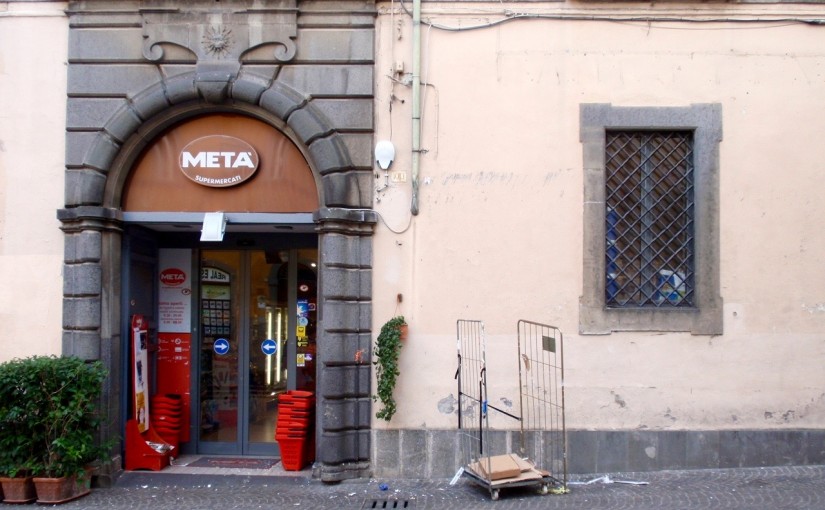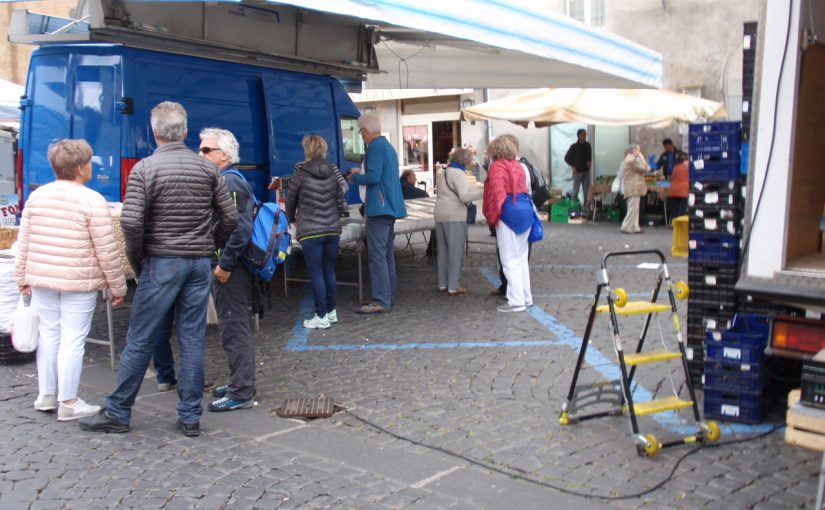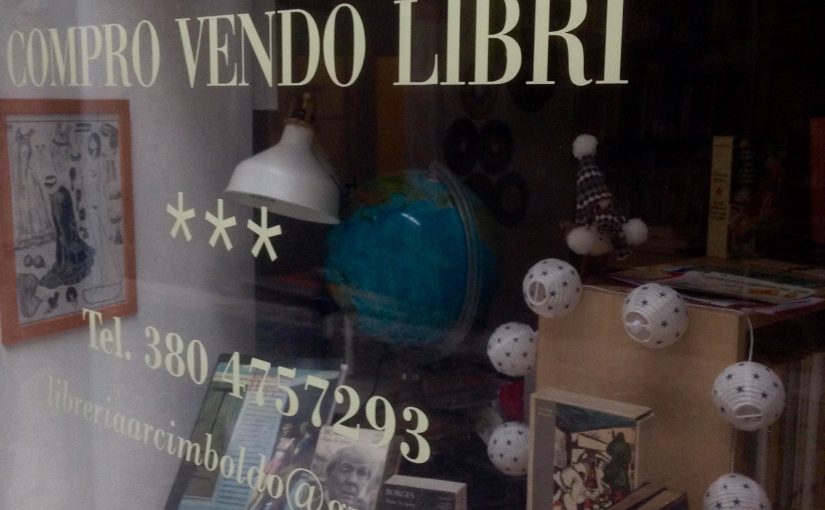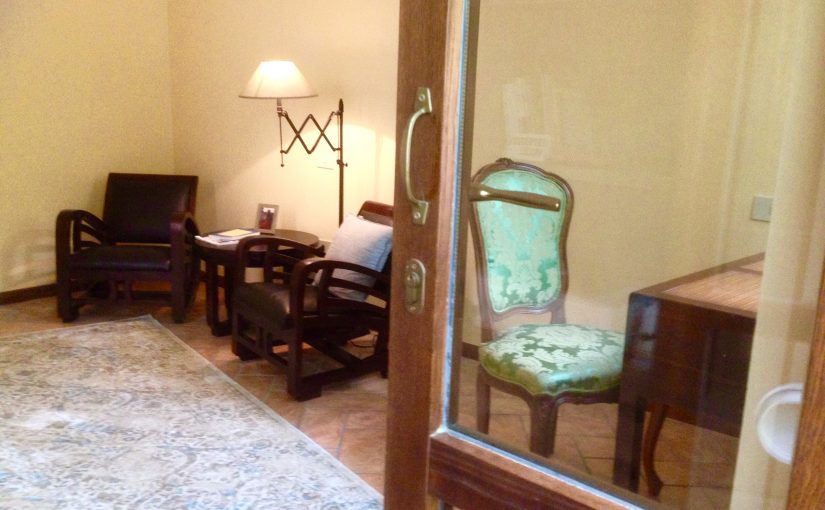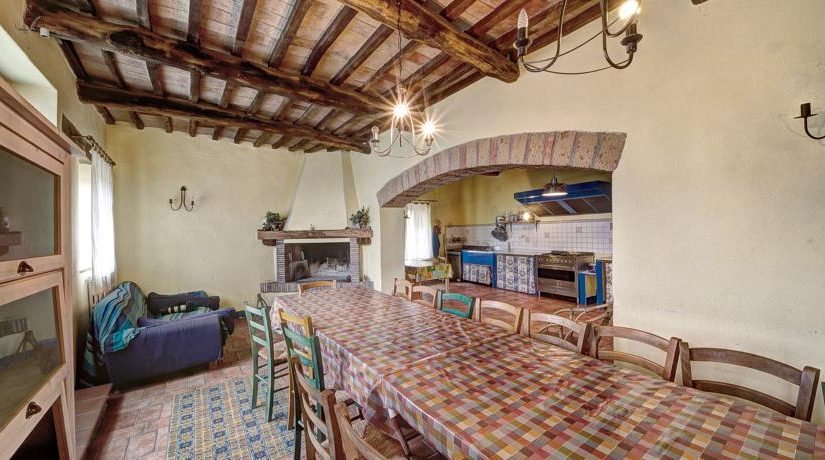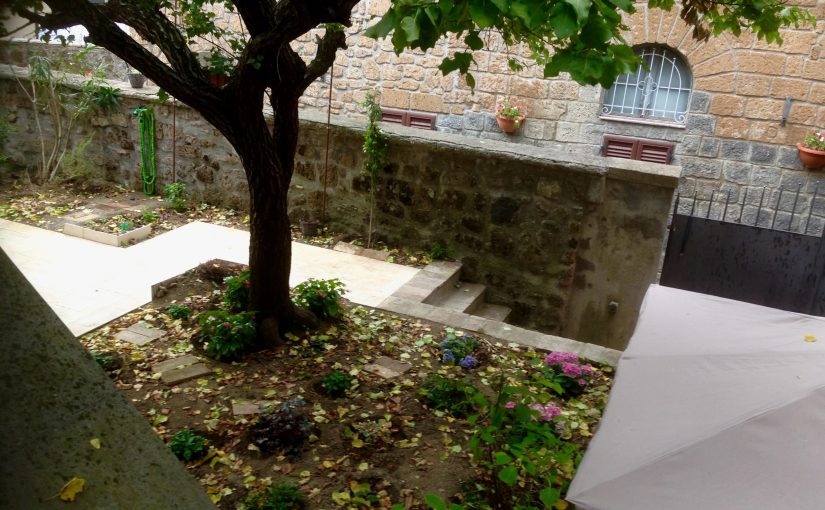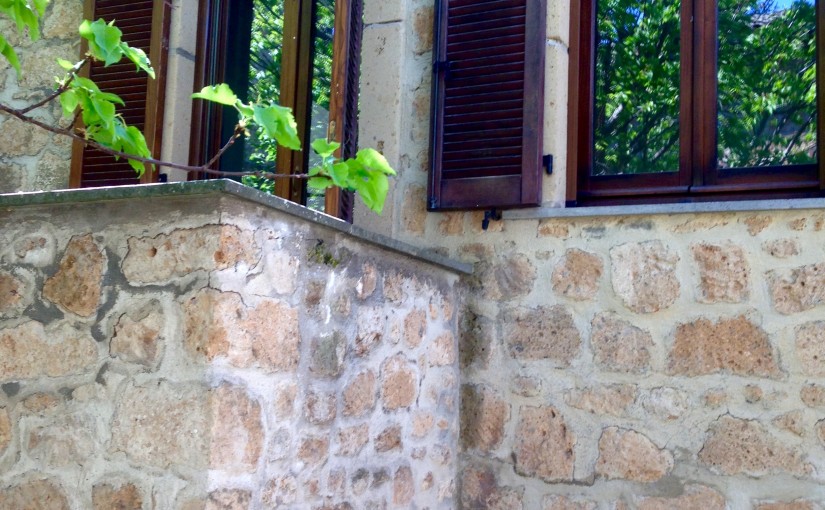Yes, Orvieto is beautiful, historic, perfectly sited, graced with wonderful civic amenities, home to a twice weekly market and dozens of mercatini throughout the year, and overflowing with cultural opportunities. So what? What keeps my motor going are daily encounters with people. I tell folks here that this is the closest I can come right now to moving back to New York. They laugh. I’m serious. I can’t afford New York any more. But living in Orvieto reminds me of a really great Manhattan neighborhood – or at least as they used to be. And that is fine with me.
Just now, my stomach told me without any equivocation that it was time for dinner. I have stuff I could have fixed, but it felt better (and quicker) to exit my garden, turn right down Via delle Pertiche, right again on Corso Cavour, and ten meters further into the pizza shop owned by a man whose name I don’t know and his son, whose name I also don’t know.
I figured out long ago that they are not of Italian ancestry. That the father (the smaller of the two) talks to me in a melange of languages ranging from Arabic to French to English, is a pretty good hint. But I think his son was raised here. He is tall and forever smiling, an infectious, welcoming smile. The kind of smile that makes a person feel that life is worth the risk. They make wonderful pizza; perfect crust, succulent, fabulously flavorful. They also offer felafel wraps and sandwiches, some of the best I’ve ever had, New York City included. They’re open from early morning to midnight, and are an open challenge to every minute I’ve ever even wanted to indulge in grumpiness or self-pity.
As I approached their shop, the father was out front munching on some of their own product and chatting with a man of about my age, who I of course immediately interpreted as being much older. The father waved his hand across the threshold when he saw me and said something about sand. I didn’t quite get it, but I suspected a traditional Arab greeting, there being a lot of sand in Arabia, or so I’ve concluded from my many formative years scanning National Geographic Magazines.
Behind the counter, the son pointed his knife at the various flavors on offer this evening, and identified each, briefly noting his favorites. I picked one with tomatoes. He gave me another slice of the same size, also with tomatoes, but a better edition according to him. I complimented him on their pizza. He replied that they sample everything. If it’s not perfect, they throw it out. “A system that works well,” I said. He smiled even more broadly and threw in a couple of small pieces of the funghi slice for free.
The father joined us, saying something I didn’t understand. “Parla arabo?” the son asked. We went back and forth on that one a dozen or so times until I understood that he was asking if I spoke Arabic. “Not in this lifetime,” I offered. “I barely speak Italian, barely speak English.” His grin grew wider.
On the way to my pizza experience, I ran into Puni, my neighbor Patrizia’s mother and Renzo’s mother-in-law. We traded niceties, then she told me, in Italian, “You have to trim that plant,” referring to a point somewhere above my mailbox. There is a violet growing in the wall there, and it is, granted, getting rather large, so I wracked my brain for how politely to say that I understood her concern, but I kind of liked it that way. “No!” she laughed when I finally was able to identify the plant I thought she was referring to. “The big one.” Oh! The apricot tree. “Yes! It’s way too big, needs pruning.” I agreed. Except for what I could reach to give a person some headroom, no one has pruned it in years. “If you don’t prune it, the roots will grow into the house!”
I explained to Puni that my family had apricot orchards in California, and best I can recall, they are best pruned in February. “Yes, February,” But it’s a science. You have to allow for the buds to begin to show so it will bear fruit come summer. I didn’t actually say all that in words, mind you, but she figured it out. “Renzo knows everything about plants.” Please mention something to him. “Oh, I will!”
Renzo is, at heart, an artist. Best I can tell, he is the force behind the seasonal decorations on Via delle Pertiche Prima; the lights and poles and swags at Christmas, the pots of flowers all year long, the banners during the big festivals. He’s the organizer. He collects the funds from neighbors, buys what’s needed, brings people together to do the actual decorating. And when the plants suffer, he replaces them. And when they become dry, he’s on his stepladder after work giving them water. He knows what they are called, not just in general, but the specific varietal of each. Somewhere off towards the west (or maybe it’s north) he has a garden. He pointed, I followed his finger, and he explained in his Orvieto accent exactly where it lay. I nodded. That’s where the bag of tomatoes that lasted me three weeks came from when he appeared at my gate one day. This is a neighbor mightily worth his salt. As a living, Renzo drives a truck for a construction enterprise.
The other neighbor who has a balcony overlooking my yard is called Marianna. She has a daughter of about 12 or 13 and a son of about 8. I hear their lives at full volume whenever they are in the kitchen, which is much of the time after five in the afternoon. The daughter waves when we catch one another’s eye, and she strikes me as bright and charming. The son hasn’t noticed me yet.
Marianna is almost unreasonably pretty, and when we converse between her balcony and my steps, has a sweet, melodious, flute-like voice. When she is speaking to her son, however, she’s all mamma; she makes her point, she doesn’t hold back, and sounds more oboe than flute. A concert oboe, a loud oboe. She has no choice. The son’s default tone is, as with many Italian boys his age, something between a sustained shout and a whine. Maybe because I can’t understand but a word here and there, it’s all music to me, and not only do I not mind, I rather enjoy it. As I climbed the outside steps after supper, mamma and son were both on the balcony painting the divan she’s cleverly designed from delivery pallets. He was murmuring something, she was cooing back, the crisis of a few minutes before having passed into love.
Earlier this evening I went to the “supermercato” – in quotes because it’s the size of a medium-large New York bodega. Perhaps because it remains open during the afternoon risposa and offers cleaning products, it’s granted a more exalted position in the hierarchy of Italian retail. It is run by a bunch of guys in their twenties. They work like demons, and are open twelve hours straight, every day, maybe even Sunday. (I never go in on Sunday because even if they don’t take their Sunday, I want to give it to them.)
The guys are always helpful, friendly, and courteous, each with a quality so distinct and memorable that going in is a little like a visit to an Umbrian Lake Woebegone. I have a feeling many people, especially foreign people, don’t try to make conversation. But I like these guys so much that I try always to ask them how they are, comment on something, inquire about a product I can’t find even if I don’t really need it. I can’t always elicit a response, but when I can it’s like childhood all over again.
Today I asked the fellow with the beard how he was doing. He explained that the change in weather was giving him some respiratory problems. I told him I seemed to be fighting a cold, as well. A simple exchange, but I, for one, felt as if something major had been achieved in international relations. When any of them pass in their Ape (two syllables, a little three-wheeled vehicle widely used for deliveries) we always wave and smile. The guy with the glasses who strides about town like a Renaissance prince in his red grocer’s smock, bows and gestures with a sweeping hand whenever we meet.
In consideration of space and your valuable time, I’m leaving out many others who are equally dear to me, but who I didn’t happen to see this evening. I honestly enjoy these people so much, and our simple relationships, that I sometimes hide at home for fear of coming off like a starstruck fool. Who needs the movies?
